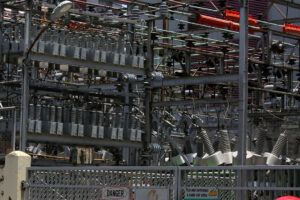By John Victor D. Ordoñez, Reporter
THE Department of Energy (DoE) on Thursday urged senators to amend the Energy Regulatory Commission (ERC) charter to allow price increases without regulatory approval as long as these fall within a set benchmark or bracket.
This would allow the regulator to do away with the cumbersome approval process that power distributors have complained about, Energy Undersecretary Sharon S. Garin told a Senate hearing looking at changes to the 23-year-old Electric Power Industry Reform Act (EPIRA).
“If the distribution utility applies for this (price increase) and it is within the benchmark and they can prove that they followed a fair, transparent procurement process, then it should not be a full-blown process but just a summary procedure that will be shorter,” she said.
The energy official said the move would also free the ERC from its time-consuming function as a quasi-judicial court when hearing price petitions.
At the hearing, Senator Sherwin T. Gatchalian pushed to empower the ERC to speed up the approval of power supply deals amid constant blackouts in the country.
“The resetting of rates is one of the most important activities of the Energy Regulatory Commission because it determines the appropriate rates entities should charge,” he said.
Ms. Garin added that her agency is also finalizing proposals for penalties the ERC can impose in cases of economic sabotage in the power generation sector.
“We are trying to finalize how to define economic sabotage as far as energy is concerned and maximize the penalty for a fault made by industry players,” she said in mixed English and Filipino.
In his third address to Congress, President Ferdinand R. Marcos, Jr. sought a review of EPIRA to address issues hounding the energy sector, particularly high energy prices.
Energy Undersecretary Rowena Cristina L. Guevarra told senators in May that 4,000 megawatts of power might be added to the country’s power generation capacity by the end of the year.
She said some power plants that eye setting up shop this year are falling behind in the application process but are ready to start operations.
“Our goal is that people have access to electricity in a reliable manner and not in intermittent energy,” Senator Pilar Julianna S. Cayetano, who heads the energy committee, told the hearing.
“We need our regulatory bodies to be on the ball, to be able to react quickly and not three years later, not five years later,” she added.
House of Representatives bills seeking to amend EPIRA are pending with its energy committee.
The House energy panel is considering changes to the ERC charter that will speed up the approval process through benchmark rates, according to a draft bill dated Sept. 1 previously obtained by BusinessWorld.
It is also considering a new provision in the charter that requires the ERC to rule on administrative cases within 30 days.
Philippine lawmakers have committed to fast-track amendments to EPIRA, which is one of the President’s priority measures.
Analysts earlier said lawmakers should limit cross-ownership and address privatization concerns under EPIRA to boost competition.
Think tank Center for Energy Research and Policy said cited the need to reform the power procurement process and increase investment incentives to boost competition.
It has also recommended enhancing the regulatory powers of the Department of Energy and the ERC.
EPIRA restructured the electric power industry by privatizing the generation, transmission, distribution and supply of power in 2001.
Under Section 5 of the law, cross-ownership — the concentration of ownership in two or more related businesses — is only outlawed between a transmission company and any company in generation and distribution.
